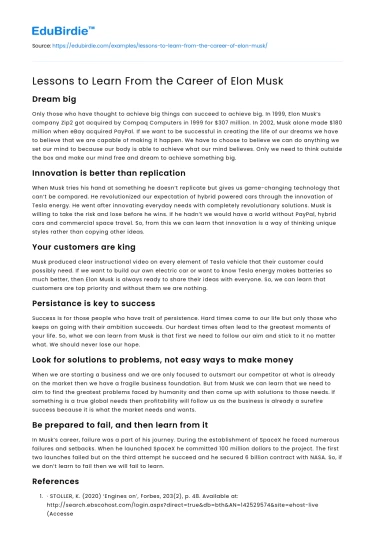Introduction
Elon Musk, a name synonymous with innovation and boundary-pushing, has become a focal point of modern entrepreneurship and technological advancement. Known for his leadership across diverse industries—from electric vehicles with Tesla to space exploration with SpaceX—Musk's career offers a plethora of lessons for aspiring entrepreneurs, business leaders, and innovators. His relentless pursuit of ambitious goals, coupled with a willingness to take risks, sets an exemplary model of visionary leadership. However, his journey is not devoid of controversies and challenges, which provide a holistic view of the complexities inherent in pioneering new frontiers. This essay delves into the key lessons that can be gleaned from Musk's career, exploring his innovative mindset, strategic risk-taking, and the importance of resilience in the face of adversity. In doing so, it also addresses criticisms and counterarguments to present a balanced perspective on his professional life.
Innovative Mindset and Visionary Leadership
One of the most salient lessons from Elon Musk's career is the power of an innovative mindset combined with visionary leadership. Musk's ability to foresee future needs and technologies has been pivotal in his success. As noted by Ashlee Vance in his biography "Elon Musk: Tesla, SpaceX, and the Quest for a Fantastic Future," Musk possesses an extraordinary ability to visualize complex systems and innovate within those frameworks. For example, his work with Tesla not only revolutionized the automotive industry with electric cars but also accelerated the global shift towards sustainable energy solutions (Vance, 2015).
Save your time!
We can take care of your essay
- Proper editing and formatting
- Free revision, title page, and bibliography
- Flexible prices and money-back guarantee
Musk's leadership style is characterized by setting ambitious goals that seem unattainable at first glance. His vision for SpaceX to make space travel affordable and eventually enable human colonization on Mars exemplifies this trait. Such grand visions motivate teams to push the boundaries of what is technically possible. However, critics argue that Musk's aggressive timelines and over-optimism can lead to stress and burnout within his teams. Despite this, his ability to maintain focus on long-term goals while navigating short-term challenges remains a critical component of his leadership success. Thus, aspiring leaders can learn the importance of balancing visionary goals with practical execution.
Strategic Risk-Taking and Resilience
Another lesson from Musk's career is the strategic approach to risk-taking and the resilience required to overcome setbacks. Musk's ventures, particularly in their nascent stages, have faced significant financial and technical challenges. The early years of SpaceX were fraught with failed launches and financial instability. However, Musk's willingness to invest his personal wealth and continue funding the company exemplifies his commitment to strategic risk-taking (Vance, 2015).
Resilience is a recurring theme in Musk's career. The 2008 financial crisis posed existential threats to both Tesla and SpaceX, with Musk famously stating he was "weeks from bankruptcy" (Vance, 2015). Yet, through a combination of securing investments and government contracts, Musk navigated these turbulent times. This resilience underscores the importance of perseverance and adaptability in entrepreneurship. Detractors may argue that Musk's financial cushion allowed him to take risks that others cannot afford. Nonetheless, the lesson lies in his calculated approach to risk, understanding the stakes, and his unwavering belief in his vision.
Addressing Criticisms and Counterarguments
While Musk's career serves as an inspiration, it is not without criticisms and challenges. Musk's management style is often described as demanding and intense, which has led to critiques regarding workplace culture at his companies. Reports from employees suggest a high-pressure environment with long hours, which some argue contradicts sustainable business practices (The Guardian, 2020). Critics also highlight instances where Musk's public statements, particularly on social media, have led to controversies impacting company valuations and public perception.
However, these criticisms also offer lessons in the importance of communication and organizational culture. While Musk's direct involvement and high standards drive innovation, they also necessitate a balance to ensure employee well-being and sustainable growth. Future leaders can learn from these experiences by cultivating an environment that promotes both high performance and employee satisfaction. Moreover, the ability to navigate public relations and maintain a positive public image is crucial for sustained success.
Conclusion
Elon Musk's career embodies a complex tapestry of innovation, risk-taking, and resilience, offering invaluable lessons for those who aspire to make an impact in their respective fields. While his visionary leadership and strategic risk-taking have paved the way for groundbreaking advancements, the criticisms he faces underscore the importance of balance in leadership. By examining both the successes and challenges of Musk's journey, aspiring entrepreneurs can glean insights into the importance of an innovative mindset, the need for resilience in the face of adversity, and the significance of fostering a positive organizational culture. Ultimately, Musk's career serves as both an inspiration and a cautionary tale, emphasizing that true innovation requires not only ambition and vision but also responsibility and adaptability.






 Stuck on your essay?
Stuck on your essay?

